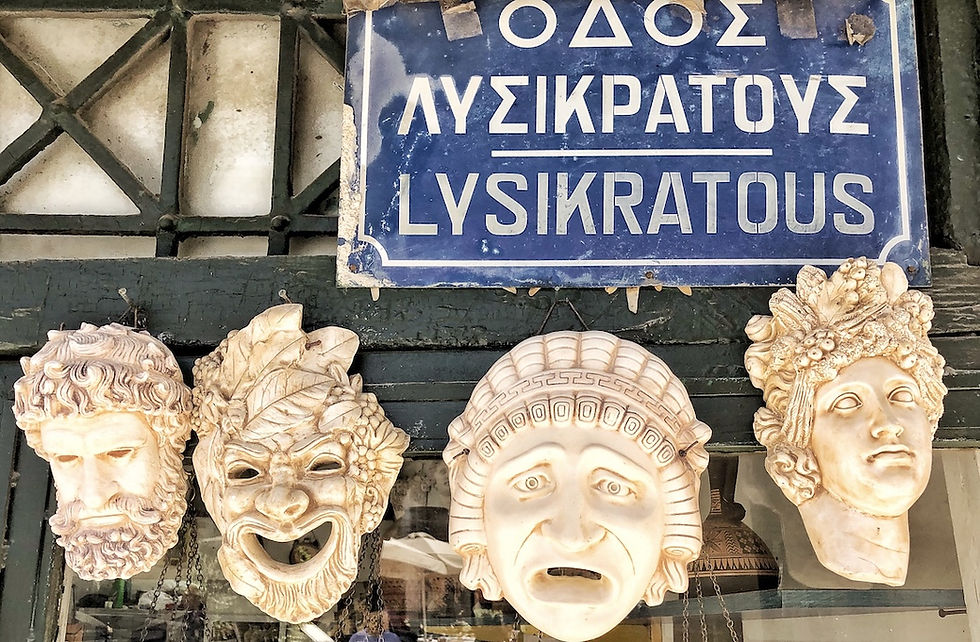Greek Name Days: What are They? Are They More Important Than Birthdays?
- Vicky Anifanty
- 6 days ago
- 5 min read
Updated: 4 days ago
In Greece, celebrating a person’s name is as important, and sometimes even more important, than celebrating a birthday. Known as Greek name days, these special occasions are deeply tied to the Orthodox Christian calendar, history, and tradition. For Greeks, they are not just about personal identity but about community, faith, and social connections.

If you have Greek friends, live in Greece, or are simply curious about its culture, understanding name days will give you unique insight into everyday Greek life. This guide explains what Greek name days are, why they matter, how they are celebrated, and the names associated with the most important feast days.
What Are Greek Name Days?
A Greek name day is the feast day of a saint or religious figure after whom someone is named. Since many Greek names are linked to saints, most people in Greece have their own name day celebration every year.
For example, a person named Maria celebrates on August 15, the day of the Dormition of the Virgin Mary. Someone named George celebrates on April 23, the feast day of Saint George.
Unlike birthdays, which are private and personal, Greek name days are communal. Friends, family, and even neighbors will call, visit, or send messages to offer their wishes.
Why Are Greek Name Days So Important?
Name days carry more social weight than birthdays in Greece. In many cases, they are celebrated more publicly and with more enthusiasm.
They are tied to religion and history.
They strengthen community bonds, since everyone remembers to wish people well on their day.
They offer a chance to gather, celebrate, and enjoy hospitality.
In small towns and villages, name days can feel like mini-festivals, with open houses and gatherings that last well into the night.
When Do Greek Name Days Happen?
Greek name days are spread throughout the year, following the Orthodox Christian liturgical calendar. Nearly every day is dedicated to one or more saints, meaning there is almost always someone celebrating.
Some days are particularly significant because they are linked to widely used names. For example:
January 1: Vasilis (Saint Basil)
March 25: Maria, Panagiota (Annunciation of the Virgin Mary)
April 23: Giorgos, Georgia (Saint George)
June 29: Petros, Pavlos (Saints Peter and Paul)
August 15: Maria, Panagiotis, Despina (Dormition of the Virgin Mary)
December 6: Nikolaos (Saint Nicholas)
How Do People Celebrate Greek Name Days?
The way name days are celebrated varies depending on the individual and region.
Traditional Celebrations
Traditionally, the person celebrating (the host) does not receive gifts only, but also offers hospitality. Their home is open to guests who stop by to wish them “Χρόνια Πολλά” (Chronia Polla, meaning “many years”). Sweets, drinks, and sometimes full meals are served.
Modern Celebrations
In cities, people may organize a dinner with friends or a night out. Colleagues may bring pastries or treats to work. For children, schools often acknowledge name days with wishes and small celebrations.
Gifts and Greetings
Small tokens such as flowers, wine, or sweets are common gifts. The emphasis is on presence and good wishes rather than expensive presents.
What Do You Say on a Greek Name Day?
The most common phrase is “Χρόνια Πολλά” (Chronia Polla), which means “many years.” Other common greetings include:
“Να ζήσεις” (Na ziseis, meaning “may you live long”).
“Ό,τι επιθυμείς” (Oti epithymeis, meaning “whatever you desire”).
Even a simple phone call or message is appreciated. Forgetting someone’s name day can be considered more serious than forgetting their birthday.
What Are the Most Popular Greek Name Days?
Some name days stand out because they are tied to very common names in Greece. These celebrations can feel like national holidays.
Saint George’s Day (April 23)
One of the most celebrated name days, dedicated to Giorgos and Georgia. Since George is among the most popular male names in Greece, nearly every community has multiple celebrations.
Saint Nicholas’ Day (December 6)
Dedicated to Nikolaos and Nikoleta. Saint Nicholas is the patron saint of sailors, so this day is especially important in coastal towns and islands.
Assumption of the Virgin Mary (August 15)
One of the biggest religious celebrations in Greece. Countless people named Maria, Panagiota, Panagiotis, and Despina celebrate on this day.
Saints Peter and Paul (June 29)
Honoring Petros and Pavlos. Large celebrations take place in many cities and villages.
Saint Basil’s Day (January 1)
The new year also marks the name day of people named Vasilis or Vasiliki. This day is celebrated with special bread known as Vasilopita.
Do People Without a Saint’s Name Celebrate?
Not all names have a corresponding saint. In these cases, people often celebrate on All Saints’ Day, which falls on the first Sunday after Pentecost. This allows everyone to have a name day, even if their name does not appear in the traditional calendar.
What Is the Connection Between Greek Name Days and Religion?
Greek name days are rooted in Orthodox Christianity. Each day of the Orthodox calendar honors one or more saints, martyrs, or religious figures. People named after them celebrate on that day, which strengthens the cultural bond between personal identity and faith.
Even in modern times, when some people are less religious, the tradition continues as a cultural practice that connects family, community, and heritage.
Are Name Days More Important Than Birthdays?
While birthdays are personal and often celebrated with close family or friends, name days are more public.
Birthdays are not traditionally as important in Greece.
Name days are widely known, often remembered by acquaintances and distant relatives.
A person may receive dozens of phone calls, messages, or visits on their name day.
In some cases, people who do not celebrate their birthday at all still host a large gathering for their name day.
What Role Do Name Days Play in Greek Culture?
Beyond their religious origins, name days serve as a reminder of Greek values. They emphasize hospitality, connection, and the importance of family. They also highlight the central role of names in identity, since many Greek names carry historical and religious meaning.
Even today, when lifestyles have modernized, name days remain part of everyday conversation, planning, and celebration.
How Do You Find Out When Greek Name Days Are?
Calendars in Greece often include name days alongside dates. Many websites and apps also provide reminders. In villages, church announcements and local traditions ensure that everyone knows whose day it is.
It is common for Greeks to know not only their own name day but also those of their close friends and family.
Conclusion: The Living Tradition of Greek Name Days
Greek name days are more than just dates on a calendar. They are celebrations of history, religion, and identity, carried out through warm hospitality and shared joy. From grand feasts on August 15 to small office treats on an ordinary weekday, these traditions reflect the heart of Greek culture: community, remembrance, and connection.
If you ever have the chance to celebrate a name day in Greece, join in the wishes and the festivities. It is one of the simplest yet most meaningful ways to experience Greek life.
Follow us on Instagram @greece for more daily inspiration.
Visit GetGreece.com, your home for all things Greek and Greece.
Vicky Anifanty is a writer for GetGreece.com who covers all things Greece, from culture and travel to local stories and daily life. Through her work, she brings readers closer to the beauty and traditions of Greece, sharing insights that highlight both its famous landmarks and hidden gems.







